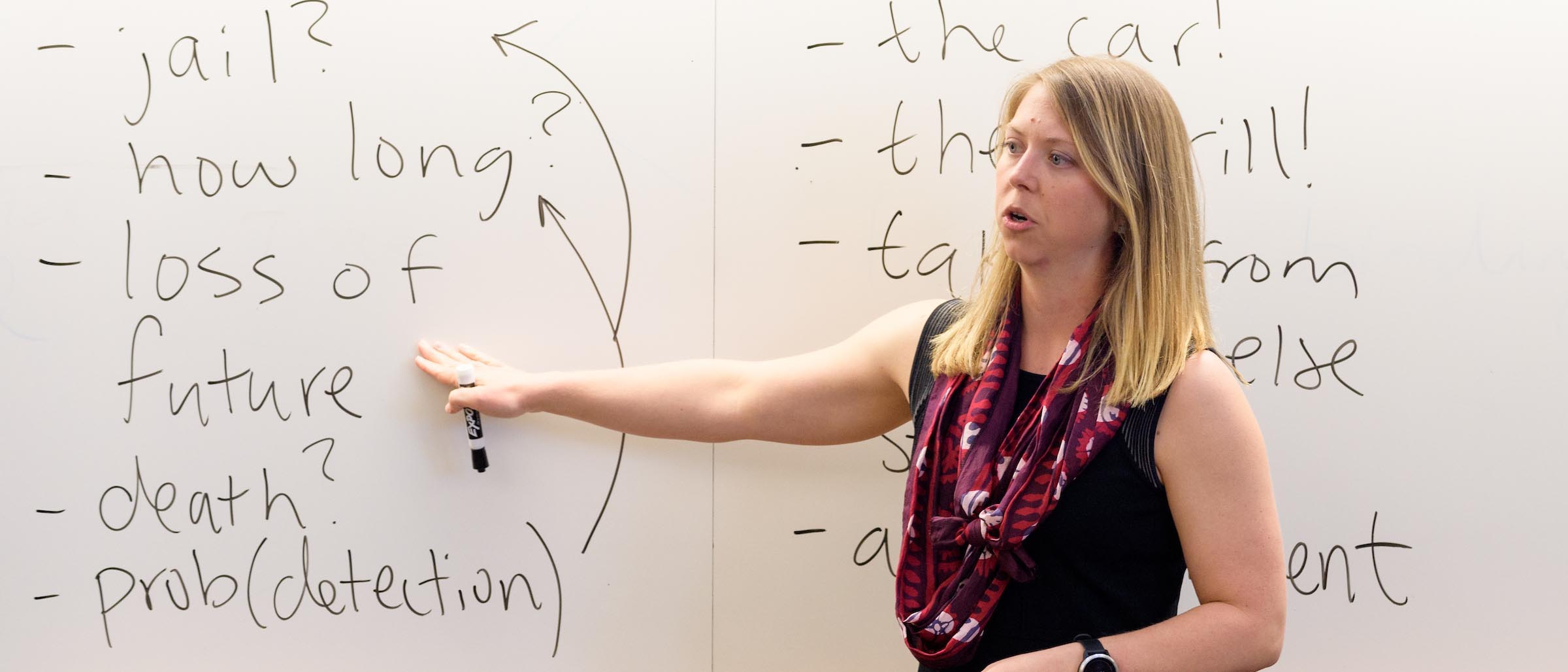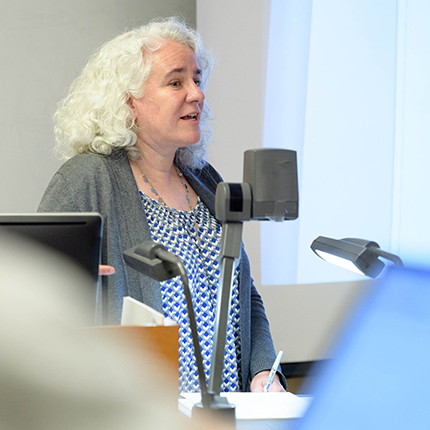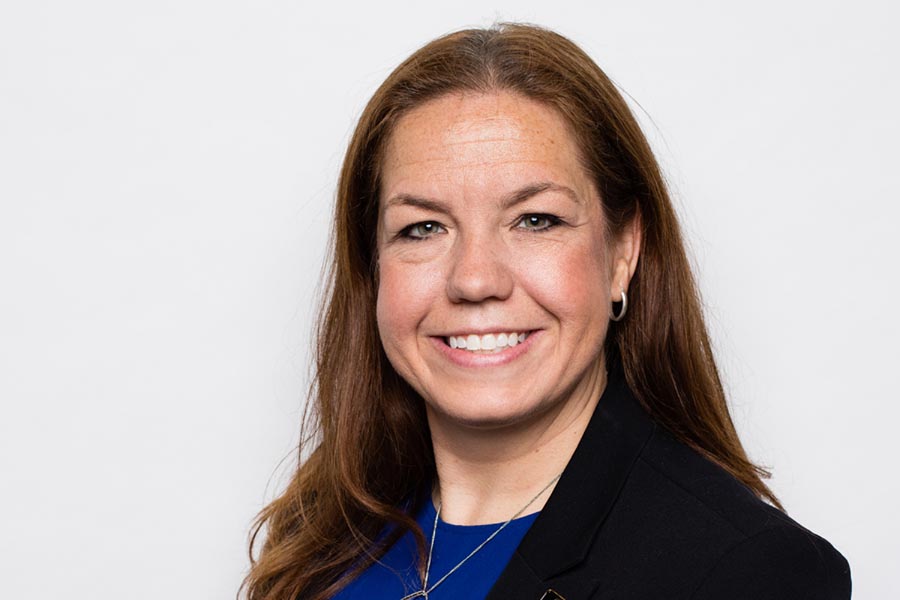
Right Ideas - Integrating ethics research and education into the classroom
At some business schools, research and teaching can be mutually exclusive, with certain faculty focusing on the former while others focus on the latter. At Purdue University’s School of Management, however, research and teaching are often intertwined.
“One of the really important questions for us to think about is how we use faculty research to make us better as a school and to make our students’ experiences better,” says David Hummels, the school’s Samuel R. Allen Dean. “It’s clear that faculties at the cutting-edge of research are exposing students to today’s and tomorrow’s problems, not problems that came out of a textbook from 20 years ago. Having active faculty research shapes the curriculum and the student experience in a profound way.”

“There is nothing that prepares students better than forming their own research idea, figuring out how to bring data to bear on the problem, and getting answers that will be useful to people.”
David Hummels, Dr. Samuel R. Allen Dean
Hummels says another way in which research is important is when companies and leading corporations come to the school for solutions. “We engage our students in opportunities for research and research-based consulting projects with companies to help them tackle big, open-ended problems and learn a skill set that will prepare them for leadership positions when they graduate,” he says. “At the same time, we generate knowledge that will help us determine how to help businesses operate and be more effective.”
At the School of Management, students also engage in research as part of their academic experience. “When you leave Purdue, you’re not taking multiple choice and true or false tests out in the real world,” Hummels says. “There is nothing that prepares students for that like forming their own research idea, figuring out how to bring data to bear on the problem, and getting answers that will be useful to people. That exposure and experience prepares students for the world they're going to face better than anything else we can do for them.”
Indeed, many people think that students need to complete an undergraduate program and have several years of PhD study under their belt before making a research contribution in the areas of management and economics. “That’s just not true,” Hummels says. “With the way we help develop our students, particularly their data analytic capabilities, they can make contributions to research areas that are important not just to the academy, but also to the way businesses are run and make decisions.”
Another key aspect of a business school education is its ongoing evolution. “We continue to learn new ways to teach students, new ways that students learn,” Hummels says. “For example, how do you apply ethical principles to business decision making? There’s no hard and fast cookbook that tells us how to do that, so the right approach is to explore what is effective and what is ineffective in helping develop those capabilities within our students.”
“It’s important that our students not only understand their responsibility as leaders to their shareholders, but also to the society in which they live,” he continues. “They need to conduct themselves and the way that their business operates in an ethical fashion, and we can't take it for granted that they will have had all the lessons about how to apply an ethical stance or an ethical approach to business.”
To that end, the school is conducting an ongoing research study on ethics education that could become a national model. According to Kelly Blanchard, a clinical associate professor of economics and associate dean for undergraduate programs, the research began in 2018 with support from the Blake Family Ethics Fund. Along with Blanchard, participating faculty are Brian Chupp, a clinical assistant professor in the organizational behavior and human resources (OBHR) area, and Cara Putman, a clinical assistant professor of law, communication and ethics.

“Repeated exposure to ethics education has a stronger and more statistically significant effect on ethical maturity.”
Kelly Blanchard, Clinical Associate Professor of Economics, Associate Dean for Undergraduate Programs
“All you have to do is look at the headlines in the Wall Street Journal or Financial Times on any given day to see examples in living color of companies that weren’t able to self-regulate by behaving ethically,” Putman says. “As a business school, we stand at a unique intersection where we can help train the future business leaders on what it means to be ethical, giving them tools and frameworks on how to make more ethical decisions.”
The researchers began by looking at what could be done to incorporate the teaching of ethics into the school’s curriculum. “What we landed on first was giving students an understanding of their own ethical perspective,” Blanchard says. “How do these students naturally respond to different kinds of ethical dilemmas?”
More than 2,500 students from selected courses across campus, including 954 School of Management undergraduates, were tested in a series of interventions (ethics lectures, reflective essays, and personal ethics inventories) to determine their impact on four different stages of “ethical maturity” – awareness, application, analysis, and action.
“We found that students in general don’t have a very robust understanding of their own ethical perspective, so what we’re doing now is helping them define their own ethical standards and perspectives so that when they do face these dilemmas, they have some idea of what solutions they can use to reach an ethical outcome,” Blanchard says.
Somewhat surprisingly, the researchers also found that limited ethics training actually makes students less ethical in the sense that as they become more aware of varying ethical perspectives, they default to “any ethics is good ethics,” Blanchard says. “However, repeated exposure to ethics education has a stronger and more statistically significant effect on ethical maturity.”
To ensure that outcome, Blanchard, Chupp and Putman are expanding their research and launching a longitudinal study that will track students from their first year through graduation as they work across core business courses that incorporate ethics content.
“There are a number of ways that we can explain ethical dilemmas to students,” Blanchard says. “Some of them are related to case studies, some of them are related to particular historical events and how you might evaluate those from an ethical perspective. Some of it is just asking them questions like, ‘Can you explain an ethical dilemma? What makes it a dilemma? Can you share a personal experience that you've had with an ethical dilemma?’ And then we continue to build on each iteration of exposure to ethics that we have.”
Making the course content understandable to students can sometimes be a challenge, however.
“We use words like consequentialism and deontology, but no one knows what they mean,” Putman says. “How do you make that practical? How do you take it out of the ivory tower and turn it into an automatic part of the process anytime someone’s making a business or personal decision? What are the different frameworks they can use when they're confronted with a decision that's going to have ethical implications?”
According to Chupp, ethics education should permeate a business school’s curriculum. “A lot of other universities approach ethics as a competency that can be checked off a list, but we want to weave it into the fabric of our undergraduate program and create a repository of case studies, assignments, seminars, and guest speakers for faculty to incorporate the topic into their coursework,” he says.

“A lot of other universities approach ethics as a competency that can be checked off a list, but we want to weave it into the fabric of our undergraduate program.”
Brian Chupp, Clinical Assistant Professor of Organizational Behavior and Human Resources
“Whether it’s in accounting, economics, OBHR, marketing, or another field of study, our goal is to incorporate an ethical tone and perspective in each of the common courses so that the majority of students will have multiple touches across the curriculum that specifically incorporate the perspective of ethical decision making.”
Ultimately, the researchers expect that an emphasis on ethics in the curriculum will allow School of Management students to develop not just an understanding and appreciation of the topic, but also the confidence and competence to display ethical leadership in business. “What we would like to see over time is an increase in students’ ability to understand different ethical perspectives and then apply and act on them,” Blanchard says.

“With the ethics in the classroom research, I learned a lot about data science techniques. It's allowed me to apply findings to novel ideas and to advance knowledge rather than repeating something.”
Eli Coltin, Krannert Senior
Among those students is senior Eli Coltin, a triple major in economics, computer science and data science who is helping Blanchard, Putman and Chupp with the quantitative analysis required by their study.
“I think it’s important to get involved in research since it allows you to apply skills that you've learned in the classroom into a more meaningful, real context,” Coltin says. “For example, with the ethics in the classroom research, I learned a lot about data science techniques. It's allowed me to apply the findings to novel ideas and to advance knowledge rather than repeating something that has already been solved.”
“The most interesting thing I found through my analysis is that whenever a student takes courses that include a model on ethics, they end up thinking more about ethics in their day-to-day life,” he continues. “It becomes more present in their mind once they’ve been introduced to it multiple times.”
According to Hummels, one of the most exciting opportunities arising from the research is not just to take an approach developed at another school, but to develop unique content that becomes a national framework for how to address ethics in the classroom. “We aspire to not only make the classroom experience for our students better, but also to teach the rest of the world how we instruct students and how we prepare them to be more ethical decision makers.”




